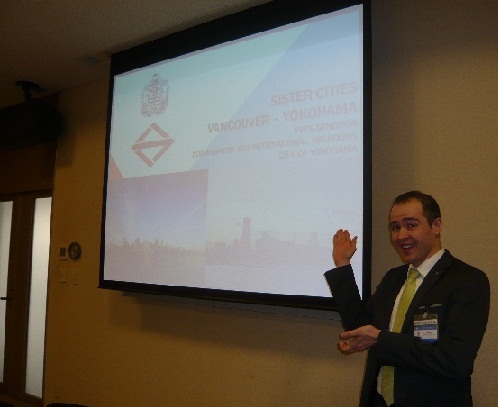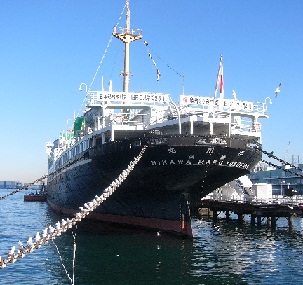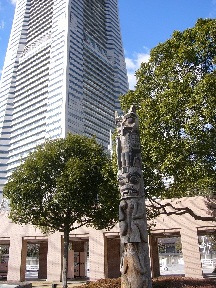Main content starts here.
Vancouver, Canada
Last updated date:2018/9/26
Yokohama's Sister City:
Vancouver, Canada
How has everyone been? My updates have been scarce of late (I even completely missed the month of January) but I fully intend to pick up the pace of my updates. This time, I hit closer to home with the city of Vancouver.
On 20 February, I went to JICA Yokohama to give a presentation to a delegation from Canada. The delegation was mainly made up of leaders of Japanese Canadian citizens’ associations from Vancouver, Regina, Toronto, Ottawa and Montreal (Yay! I met a fellow Montrealer). This delegation had come to Japan via a project by the Ministry of Foreign Affairs of Japan. The goal of their coming to Yokohama was to visit Japanese Overseas Migration Museum of JICA Yokohama.
My presentation started with a bit of history that shows just how similar Vancouver and Yokohama actually are, and then went into more detail about the actual cooperation between the two cities. Here is a look at what I presented:

For more than a hundred years, people have emigrated from Yokohama to the rest of the world. The destinations have mainly been Brazil, Peru, U.S. and Canada. In memory of these brave people and their descendants, centers were opened in certain cities to explain this history such as the Nikkei National Museum & Cultural Centre(外部サイト) in Vancouver or the Japanese Overseas Migration Museum of JICA Yokohama.
Vancouver and Yokohama became sister cities in 1965, but the two cities are similar well beyond that. The conclusion of the Treaty of Amity and Commerce between the United-States and Japan in 1858 allowed Yokohama to open its port to international trade the next year, in 1859. 1858 also marked the beginning of the gold rush along the Fraser River in Canada during which the population of the original Gastown quickly grew by more than 25,000 new inhabitants and which later brought on the incorporation of the city of Vancouver. It could be said that 1858 is an important year for both cities.
Vancouver and Yokohama are also similar in that they had become important port cities for their country around the end of the 19th century. Indeed, in only 30 years or so, Yokohama had grown from a small fishing village of 100 families to being Japan’s gateway to the world with a population of 120,000. Much of Japan’s import of western culture and first forays into modern technologies were brought in through this very city. As for Vancouver, it had become known as “Terminal City” for its famous Vancouver-Hong Kong maritime corridor and for being the westernmost stop on the Canadian Pacific railroad.

While I’m on the topic of transportation, I’ll add that the vessel named Hikawa-Maru, launched in 1929, used to connect Yokohama and Vancouver through the Yokohama–Seattle, Vancouver corridor. During the 2nd World War, she became a hospital ship and so survived Allied campaigns. She has now become a floating museum berthed in Yamashita Park in Yokohama.
As sister cities, Yokohama and Vancouver cooperate on various fronts. One of the most active areas of exchange between the two cities is education. For example, The University of British Columbia and Yokohama City University have an academic exchange agreement under which they have conducted various joint researches, joint seminars and mutual visits of staff.
Currently, there are also 4 sister-school agreements between high schools in both cities:
1 - The first sister-school cooperation was established between Yokohama’s Minato Sohgoh High School and Vancouver’s Britannia Secondary School in June of 2005, which is the year that marked the 40th anniversary of sister-city relations. In Minato Sohgoh’s own words (taken from its website(外部サイト)), “[the] school has been enjoying a partnership with Britannia Secondary School in Vancouver since 2005. [The] students are very fortunate to have an opportunity to meet Canadian students and learn about their culture, language, and expand their horizon.”
2 - In 2008, Yokohama Science Frontier High and David Thompson Secondary(外部サイト) have also established a similar bond. Each year, in November, 20 students from David Thompson Secondary and two of their teachers visit Japan and students from Science Frontier High. In addition to a great tour of important Japanese sites, the students are hosted by Japanese families, giving them an unparalleled opportunity to experience Japanese culture first hand.
As for Science Frontier High, which is one of the most technologically and scientifically advanced high schools in Japan, their part of the program, which takes place in March, nurtures rich internationalism and communication skills through home-stays with families in an English-speaking environment and presentations in English during classes at David Thompson Secondary. Some classes allow for discussion of global-scale issues and how to continue cooperative efforts after returning to Japan.
3 - In June 2011, an agreement was established between Minami Middle and High Schools in Yokohama and Point Grey Secondary School in Vancouver. The last implementation of this agreement took place from February 10th to the 16th 2013. Students and teachers from Minami Middle School went to Vancouver to meet and exchange with students from Point Grey Secondary.
4 - The most recent sister-school agreement was established in summer 2015 between Sir Winston Churchill Secondary School in Vancouver and Yokohama Commercial High School(外部サイト)in Yokohama.
On top of exchanges between schools, the cities have worked out an exchange between libraries since 1992. Yokohama City Central Library and the Vancouver Public Library selectively exchange books and publications to reach the citizens and introduce the sister-city ties by, for example, holding exhibitions of books on various aspects of life, not only life in the sister-city itself, but also in its country.
To facilitate exchanges between the cities, the Yokohama-Vancouver Friendship Committee was established in August 1966. This Yokohama based committee strives to deepen exchanges between Yokohama and its sister-city Vancouver by setting up various activities. These include introducing the city of Vancouver and its culture as well as teaching the history behind the bond between the two cities through the production of pamphlets and the promotion of products from Vancouver.

Not only are they sister cities, Vancouver and Yokohama also operate a sister-port agreement. This agreement was established in 1981. Since then, harbor seminars have been held as well as information exchange activities. On the 10th anniversary of this cooperation in 1991, Vancouver offered a totem pole to Yokohama in honor of their bond of friendship. The totem pole can still be admired in the Nippon-Maru Memorial Park in the Minato Mirai 21 District.
On top of being sister cities, sister ports and having sister high schools, Vancouver and Yokohama have sister Chinatowns! Vancouver’s Chinatown is the 2nd biggest Chinatown in North America, while Yokohama’s is the biggest in Japan. I suppose it is only fitting that they would establish a sisterhood. This cooperation started in 1995 and saw mutual visits by representatives of each city on different occasions.
Finally, a new page of history in the exchange between Vancouver and Yokohama was written no earlier than January 2013, when Mr. Burke Taylor, the founding President of the Creative City Network of Canada (CCNC) and former Director of the Office of Cultural Affairs for the City of Vancouver, attended the inaugural meeting of the Creative City Network of Japan (CCNJ) in Yokohama.
Through its work, CCNJ strives to help build the capacity of local cultural planning professionals – and by extension local governments – to nurture and support cultural development in their communities. 40 groups and individuals had assembled for its establishment. The CCNJ of course welcomes CCNC’s advice and wishes to develop further their relationship with this pioneer of creative city networking.
The main goal of the presentation was to use this opportunity to raise interest for the ties between Vancouver and Yokohama in the Canadian delegation that visited us last week. Considering the many questions and precisions we were asked after the presentation, I think we succeeded!
Note: I added new information to the section about school exchange, because a new agreement was signed between another 2 institutions in 2015.
I left all other information as it was in the 2013 article. Thank you for understanding that more activities may have taken place since the article was originally published.
Page ID:842-061-171

